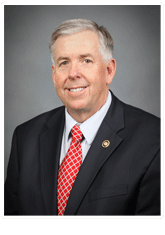This week most of the focus of the Missouri Senate was on the state budget. With the Appropriations Committee finishing its work last week, the full Senate began debate on the spending plan Monday afternoon. Following nearly eight hours of sometimes contentious debate, the Senate gave first round approval to the thirteen appropriations bills that comprise Missouri’s operating budget. By Constitution, Missouri is required to have a balanced budget. We cannot deficit spend. The only debt that is allowed are revenue bonds for specific projects. The payments for these bonds are contained in HB1, and must be paid before any other bills.
As expected, there was considerable debate in the area of the budget related to Department of Revenue’s ongoing situation of scanning and retaining documents related to holders of Conceal and Carry permits. Department of Public Safety and Office of Administration also came under some scrutiny during the debate. Earlier in the process, the Chairman of the Appropriations Committee removed several million dollars from Department of Revenue to get their attention as the investigation into their practices continues. During debate it was acknowledged the cut is unlikely to stand at that level, but leverage is needed to compel the department to follow state law as it pertains to the privacy of Missouri’s citizens.
Another area that drew significant debate was the portion dealing with Medicaid. An amendment was offered to expand Medicaid in Missouri to the level outlined in accordance with the federal Affordable Care Act. Since the beginning of the Legislative Session, this has been an issue receiving significant attention. Medical interests, social welfare groups, and many chambers of commerce have pushed for the expansion, while taxpayer organizations and conservatives have pointed to a system already plagued by inefficiencies and abuse. Also in the equation is the fact Missouri has already rejected the idea in a statewide vote. After impassioned debate from both sides, the proposal was defeated.
Most departments saw a cut to their travel allowances. In past years it was common practice for state employees to frequently gather in Jefferson City for conferences, seminars, and other various meetings. Now, with tools like Skype and other face to face internet media, seminars (now known webinars) make such trips much less necessary. As technology evolves, it only makes sense to use it to the taxpayers’ advantage.
Of interest to rural districts such as ours, over $600,000 was added to the Rural Crimes Unit. This program has been especially helpful to local law enforcement as high cattle and scrap metal prices have brought about increased theft of these commodities in the region. Also relevant to our area, $66 million was added to the Foundation Formula that funds Missouri’s K-12 schools.
. |



